Food Studies News
A More Sustainable Campus
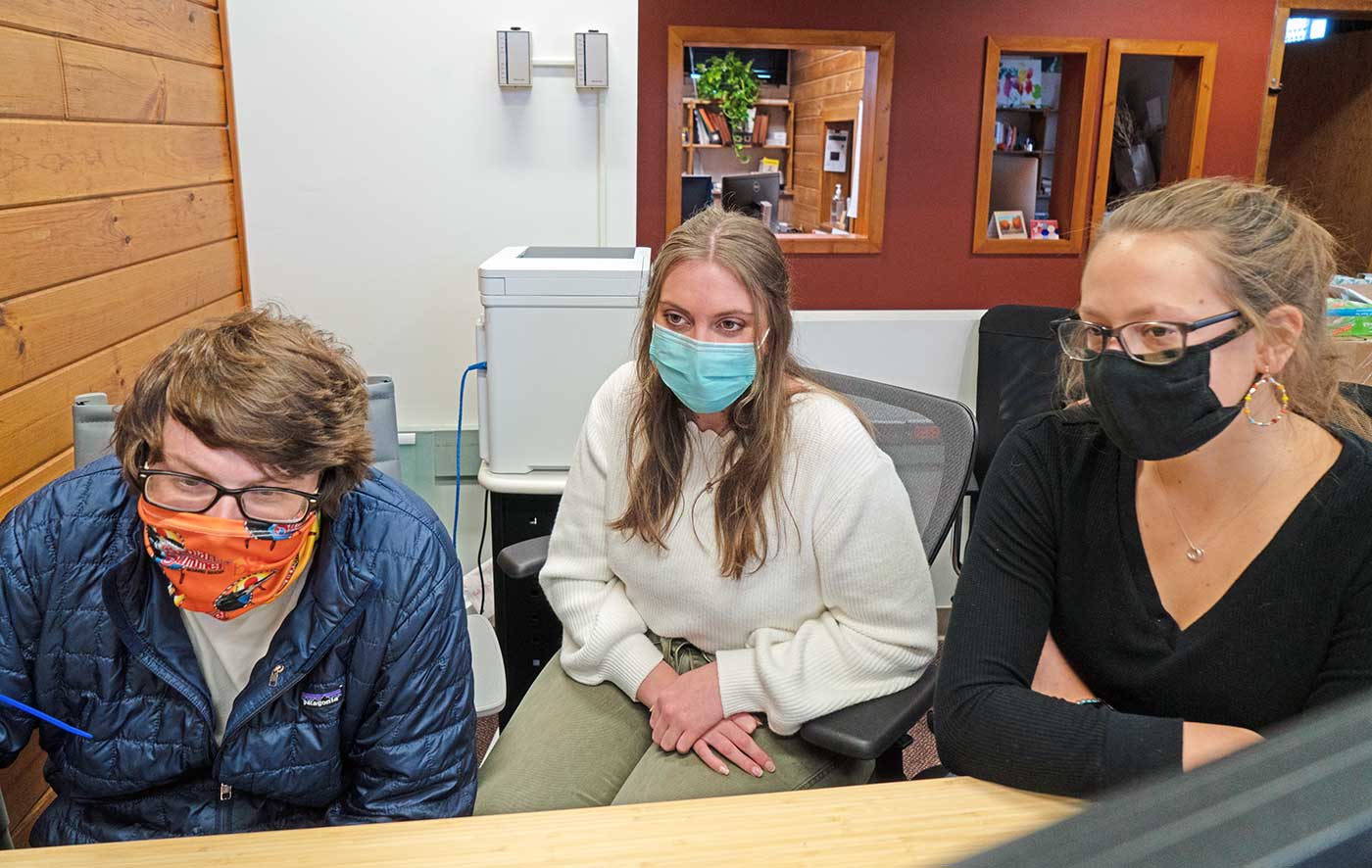
Before they graduate and make an impact in the world, Falk College seniors Claire Rein, Tucker Kopp and Caroline King made their impact on the Syracuse University campus as interns with the University’s Sustainability Management team.
Rein, Kopp and King interned in the Fall 2021 semester through Sustainability Management’s for-credit internship program that allows students to pursue projects that complement their major and explore their interest in sustainability.
“Our internship program is designed to allow students to explore their passions outside of the classroom environment while recognizing the broad impact sustainability has on all majors,” says sustainability coordinator Meg Lowe G’18, who manages the internship program. “At the same time, each project a student works on helps us achieve our goals with a current program or develop a new initiative on campus.”
Rein’s internship project focused on reducing plastic consumption, Kopp explored food insecurity, and King drafted a plan to implement more renewable energy on campus. Rein, who transferred to Syracuse in the fall of 2019, says her internship has so far been the highlight of her Syracuse experience.
“My internship made up for many of the things that I missed out on (because of pandemic restrictions),” Rein says. “I have incredibly supportive and friendly supervisors, as well as other amazing student interns that have made my experience so amazing! While I have learned a lot by doing my research project, I have also gained both a professional network and some great friendships.”
Sustainability Management works with each student’s advisor to ensure the internship aligns with the student’s academic goals, and a single internship can offer the chance to become immersed in several aspects of sustainability.
“We work closely with academic advisors to ensure we’re meeting the needs of every program,” Lowe says. “We hope each student walks away with a thorough understanding of sustainability in a way they can carry it throughout their life.”
As the three Falk College students concluded their internships, they shared more about their projects and experiences with us. Here are their stories:
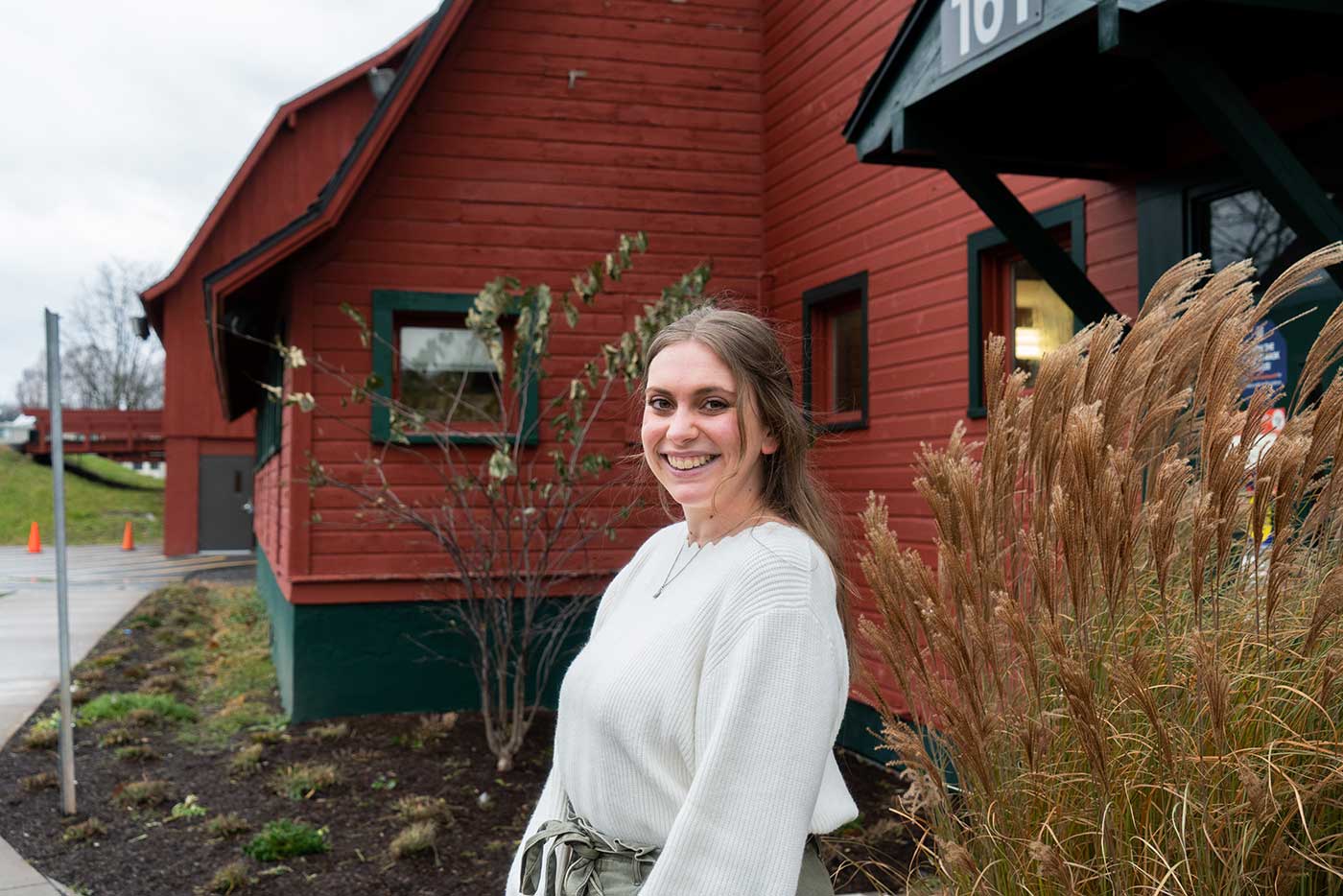
Claire Rein: Set Up for Success
Growing up in Syracuse just a few miles from the University, Rein enjoyed singing, dancing, playing musical instruments and, of course, attending Syracuse Orange sporting events. She was attracted to Falk College’s Department of Public Health because of its experiential learning–the “the real-life application of knowledge” that she says has prepared her for a successful career in medicine.
“In my studies of public health, I have gained significant knowledge about the American healthcare system, healthcare disparities and social determinants of health, and how to do scientific research,” says Rein, who currently works as a patient care technician at St. Joseph’s Hospital in Syracuse. “I have been able to work with a high school equivalency class, participate in PTSD research, work at the Office of Sustainability Management for my internship, and much more.”
For her internship project on reducing plastic consumption on campus, Rein researched microplastics and their connection to public health, the issues with plastic recycling, and the social justice issues surrounding the plastic industry. She determined that aluminum cans are the best alternative and created a proposal for the University to transition to aluminum packaging for its vending machines.
“While the goals of recycling are great, the actual implementation does not match up,” Rein says. “Oftentimes, recyclables get contaminated and never end up being recycled, meaning they are either put in a landfill, incinerated, or end up polluting the natural environment.
“The industry was never designed to support such a large volume of recyclables,” Rein adds, “so our lack of recycling infrastructure in America has made it so that it’s sometimes not worth it economically to recycle.”
As she looks forward to graduation, Rein says she wants to positively influence the healthcare sphere by improving the experience for patients who are often overlooked and vulnerable.
“This could be, for example, implementing policies within my practice to better educate care plans to people with low healthcare literacy or language/cultural barriers; focusing care plans on the individual needs, perspectives and abilities of the patient; or finding ways to prevent socio-economic status from hindering the ability to receive excellent long-term care,” Rein says. “I believe being a public health major at Syracuse has really set me up for success when it comes to achieving these goals.”
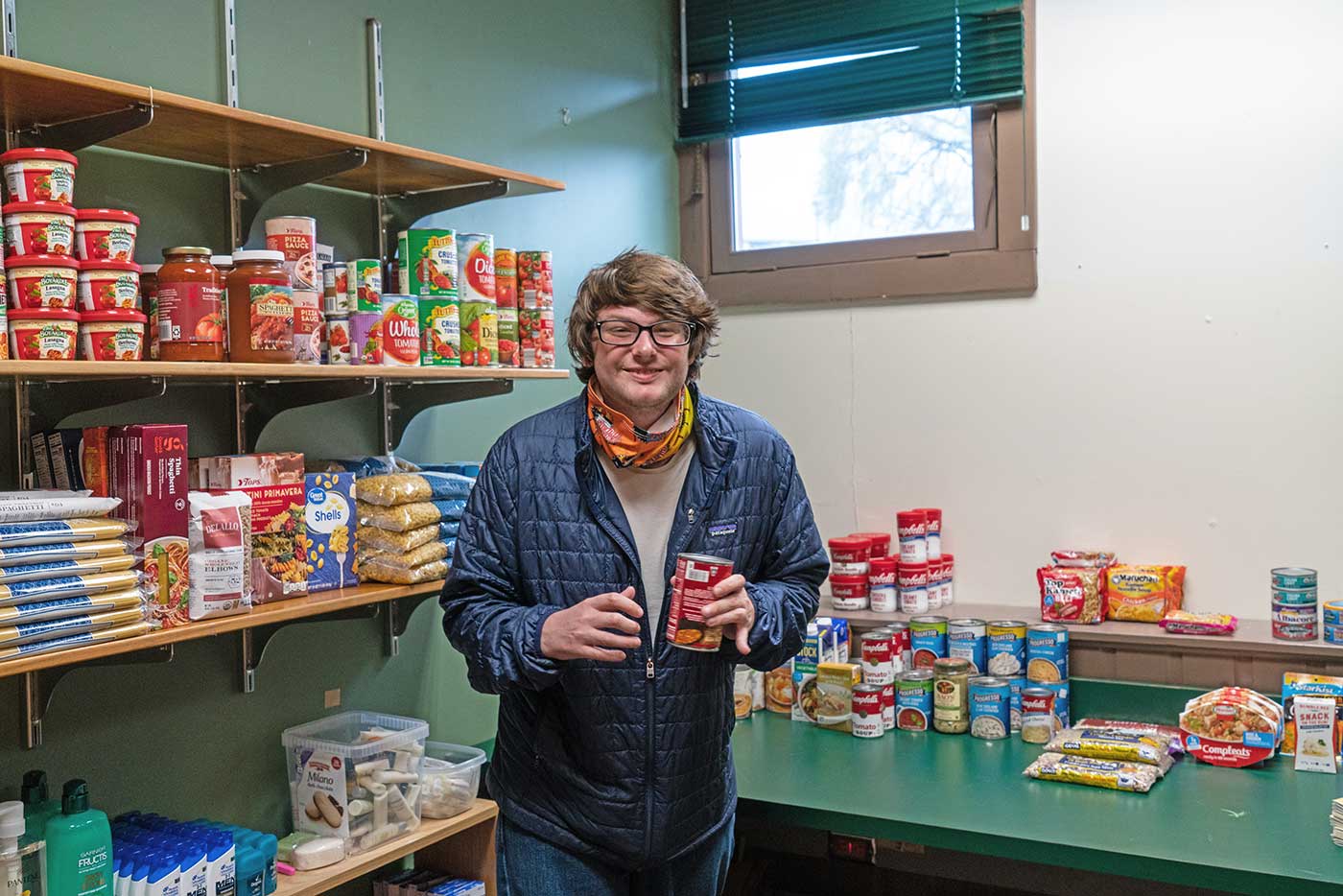
Tucker Kopp: Ending Food Insecurity
Kopp grew up about 20 miles southeast of Syracuse in Cazenovia, where he started to ride horses when he was just 3. He also enjoyed baking and would spend hours baking with a friend, who sadly passed away last year.
Kopp enrolled at Syracuse University through InclusiveU, which provides opportunities for students with intellectual and developmental disabilities who want to experience college life in a fully inclusive setting. Kopp is a Food Studies major at Falk College, where his passion for baking and food is matched only by his enthusiasm for making friends.
“I’m a people person,” Kopp says, “I love to meet new people and make friends.”
Kopp is in his internship year at InclusiveU, and with Sustainability Management he studied food insecurity on college campuses. As Kopp points out, the Hendricks Chapel food pantry at Syracuse is stocked with food and personal care items that are available at no cost to all students with a valid Syracuse University or SUNY ESF ID.
“The most important thing I wish people knew about food insecurity on a college campus is how to use a food pantry if you don’t have enough money to buy food for yourself,” Kopp says.
InclusiveU Director Brianna Shults says Kopp grew “personally and professionally” from his internship, which was a valuable piece of his experience at the University and tied together his certificate in Culinary Arts with his career goals.
“After working alongside Meg (Lowe) and his other colleagues, Tucker better understands where food comes from and how hard it can be for some to access it,” Shults says. “Tucker valued his opportunities to participate in other projects, such as the virtual cooking class. His work at Sustainability Management really allowed him a new view on how food is experienced and accessed outside of traditional food services.”
Kopp’s education at Falk and his internship with Sustainability Management has given him options as his looks forward to his life and career after graduation.
“I want to do something with horses,” Kopp says. “But if that doesn’t work out, I want to do something culinary-related!”

Caroline King: Quality Healthcare for All
King grew up in the mountains of central Pennsylvania, where hiking and backpacking trips became her favorite hobby (she and her father still go on multiple backpacking trips every year). She entered Syracuse as a nutrition student but switched to a dual major in public health at Falk and policy studies at the Maxwell School of Citizenship and Public Affairs.
“As I aged, I began learning more about health disparities and the adversities faced in the healthcare system by minority communities,” King says. “I quickly developed a passion to be a part of the shift to providing equitable, affordable access to quality healthcare for all.
“Additionally, public health includes the health of the environment, which was an added attraction as my connection to the earth is strong,” King says.
For her internship, King researched renewable energy (RE) from a public health perspective. She looked at the sustainability of RE throughout its entire life cycle, from sourcing precious metals to the disposing of end-of-life RE systems.
With the information she gathered, King drafted a policy to propose to the University to use more RE on campus.
“I wish people would take the time to think about their energy consumption, where it’s coming from, and how big of an impact it’s causing on the planet,” King says. “It’s easy to put your consumption out of mind when the effects are out of sight, however, we need to be conscious of the impact that the things we do and purchase have on other people and the environment.”
King is a Renée Crown Honors Program student and member of the Phi Sigma Pi Gender-Inclusive National Honors Fraternity, where she has met students with various majors who share her vision of being part of a team that makes a difference in the lives of others.
“I wish people would understand the privilege they have to live the life they do so that they are able to empathize with people of all types around them,” King says. “As I move through jobs, careers and life, I hope to be in a position where I can be a part of a team that makes a large impact on a community, population or the environment.”
Falk Hosts Sports Nutrition Expert
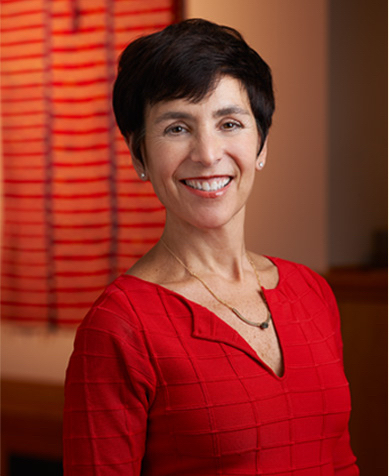
Nationally known sports nutrition expert Leslie J. Bonci will present “Fuels of Engagement: Nutrition Trends That Should Stay and End” at 6:30 p.m. Thursday, April 14, in Grant Auditorium at the Falk College complex.
Bonci is the featured speaker of the sixth annual Ann Selkowitz Litt Distinguished Speaker Series. The lecture is free and open to the public, and light refreshments will be served at 5:30 p.m.
“I am so honored and excited to speak at Syracuse University and honor the legacy and memory of a colleague, a pioneer and a wonderful sports registered dietician, Ann Litt,” Bonci says. “My topic is ‘Fuels of Engagement,’ which will focus on how to strategize, optimize and realize goals through food choices and eating habits activation.
“How can we tune out the misinformation, create order out of chaos, eat within our means and make progress without unintended consequences?” Bonci adds. “Individualization with food choices should nurture, empower, enable and complement lifestyle, health, and well-being in an affordable, available, accessible and actionable manner.”
Bonci, MPH, RD, CSSD, LDN, is the owner of Active Eating Advice, a nutrition consulting company, and co-founder of Performance 365, a sports nutrition consulting company. Her clients include the National Dairy Council, California Dried Plum Board, Bayer USA, Produce for Better Health Foundation, National Peanut Board, Gatorade, GoodSport, Ready Nutrition, General Mills and KLEAN Athlete.
She is currently the nutrition consultant for the 2020 Super Bowl champion Kansas City Chiefs and the Fan Controlled Football (FCF) indoor league. She was previously the company nutritionist for Pittsburgh Ballet Theatre and sports dietitian for Carnegie Mellon University athletics and the WNBA, NFL’s Pittsburgh Steelers, NHL’s Pittsburgh Penguins, and Major League Baseball’s Pittsburgh Pirates, Toronto Blue Jays and 2019 World Series champion Washington Nationals.
To get a sense of Bonci’s presentation April 14, watch these videos on the Active Eating Advice website to observe Bonci working with athletes to help them be their best, mentoring children to help them cultivate and create an atmosphere of food appreciation, and communicating general wellness strategies around fueling for activity.
Bonci received a Bachelor of Science degree in biopsychology from Vassar College and a Master of Public Health degree in nutritional epidemiology from the University of Pittsburgh. The author of several popular fitness and nutrition books, Bonci is a regular blogger for U.S. News & World Report’s Eat + Run webpage and hosts weekly television and radio segments for KDKA television and radio in Pittsburgh.
A sought-after national and international speaker, Bonci is an advocate for programs that address food and nutrition insecurity, and an advocate for agricultural biotechnology and sustainability. She is a firm believer in evidence-based practice over sensationalism and incorporates equity, diversity and relevance into her presentations and practice.
Here are the details:
What: Sixth annual Ann Selkowitz Litt Distinguished Speaker Series.
When: 6:30 p.m. Thursday, April 14 (light refreshments at 5:30 p.m.).
Where: Grant Auditorium in the Falk College complex at Syracuse University (campus map).
Who: Sports nutrition expert Leslie J. Bonci will present “Fuels of Engagement: Nutrition Trends That Should Stay and End.”
Parking: Free parking is available in the Stadium Lot off Raynor Avenue. (Directions to Stadium Lot).
For more information and accommodations requests, please contact Annette Hodgens at ahodgens@syr.edu or 315.443.9816.
About the Ann Selkowitz Litt Distinguished Speaker Series
Ann Selkowitz Litt ’75 (1953-2007) was a nationally known nutritionist who helped children and adolescents with eating disorders and assisted developing athletes in reaching their full potential. The nutrition consultant to CosmoGirl magazine, Litt was the author of The College Students’ Guide to Eating Well on Campus, Fuel for Young Athletes, and the American Dietetic Association Guide to Private Practice. She was the nutritionist for the NFL’s Washington Redskins and served as spokesperson for several media campaigns during her career, including the Got Milk campaign. After her death, the Ann S. Litt Foundation, Inc., was created to support nutrition education. Through a generous gift from this foundation to Falk College, the Ann Selkowitz Litt Distinguished Speaker Series was created at Syracuse University in 2015.
A Nourishing Alliance
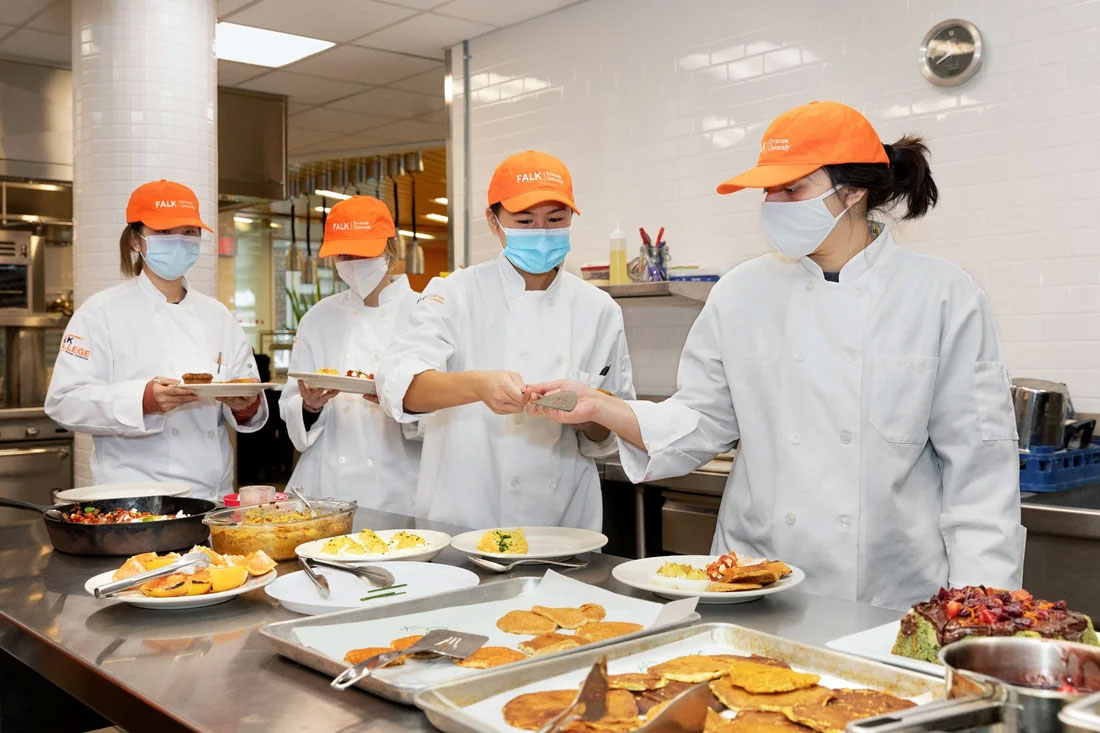
Natalie Antosh was a third-year student at Upstate Medical University in 2019 when she noticed a gap in the medical school curriculum—there was little nutrition content. Acutely aware of the role nutrition plays in many diseases, she decided to survey her fellow medical students and found that the majority wanted more nutrition instruction. Ninety-five percent said they would welcome an elective nutrition course.
Antosh teamed up with Dr. Barbara Feuerstein, a professor of medicine at Upstate and an endocrinologist at the Joslin Diabetes Center, and Dr. Beth Nelson, a professor of pediatrics at Upstate, to brainstorm about creating a nutrition course. Nelson had completed a master’s degree in nutrition at Syracuse University’s Falk College prior to attending medical school and knew that the Falk faculty expertise was just what they needed. They reached out to professors Kay Stearns Bruening and Sudha Raj in Falk’s Department of Nutrition and Food Studies and began designing a nutrition course for fall 2019.
Within hours of announcing the addition of a new elective called Food as Medicine, the class was filled.
Developing a Curriculum
Bruening, director of Falk’s Nutrition Assessment, Consultation and Education Center, was asked to provide an introduction and an overview for the course, as well as a session on fad diets. “I taught it as a session on the world’s healthiest diets and what they have in common, and then organized a presentation of whole foods by food group with an emphasis on their clinical medical implications,” she recalls.
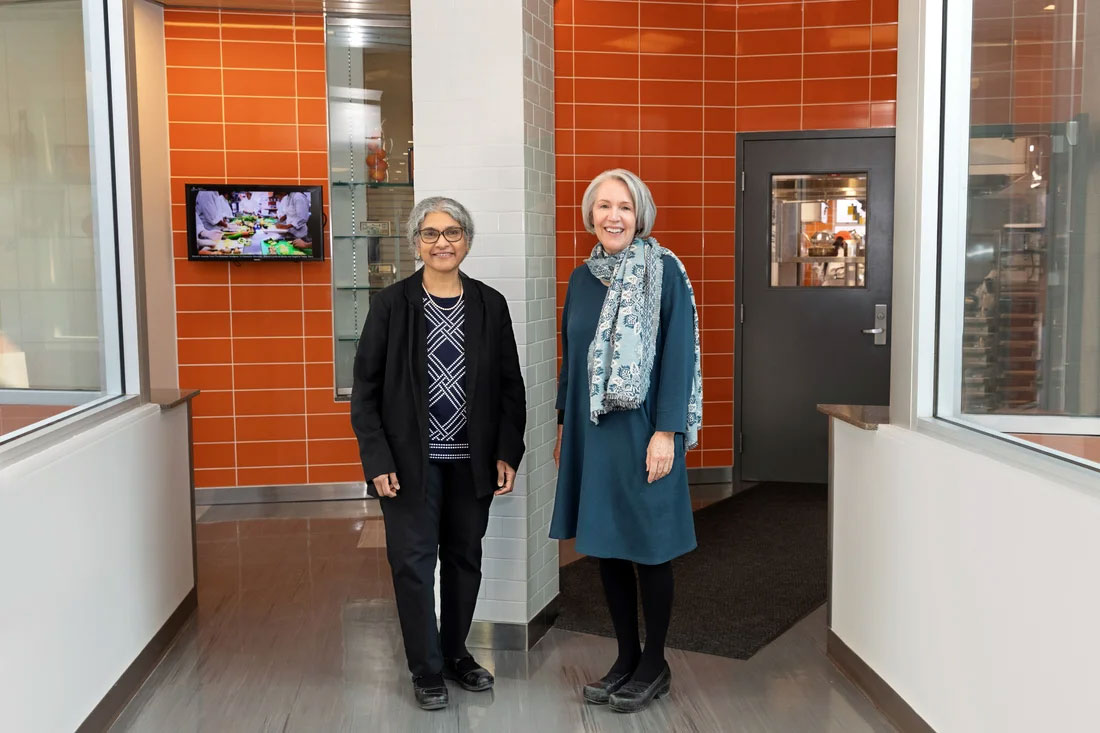
Bruening notes that the Food as Medicine course content is different from what she uses in her Falk clinical courses. “My Falk courses include content on the pathophysiology of diseases, how it affects nutrition status and the nutrition care process,” she says. “Medical students would already know the pathophysiology, and their approach to assessing patients is different from the approach of nutrition professionals.”
Feuerstein points out that medical students will go into many different specialties, so they have a variety of reasons to take the course. “Beyond professional applications, I think some students also found the nutrition class helpful for their own lives—one assignment on taking a nutrition history from a family member had some enlightening surprises for many students.” And the course provides a variety of experiences that are especially valuable for expanding medical students’ perspectives. “Shadowing an Overeaters Anonymous session, sitting in with various dietitians and creating a cookbook are great learning experiences for our medical students,” she says.
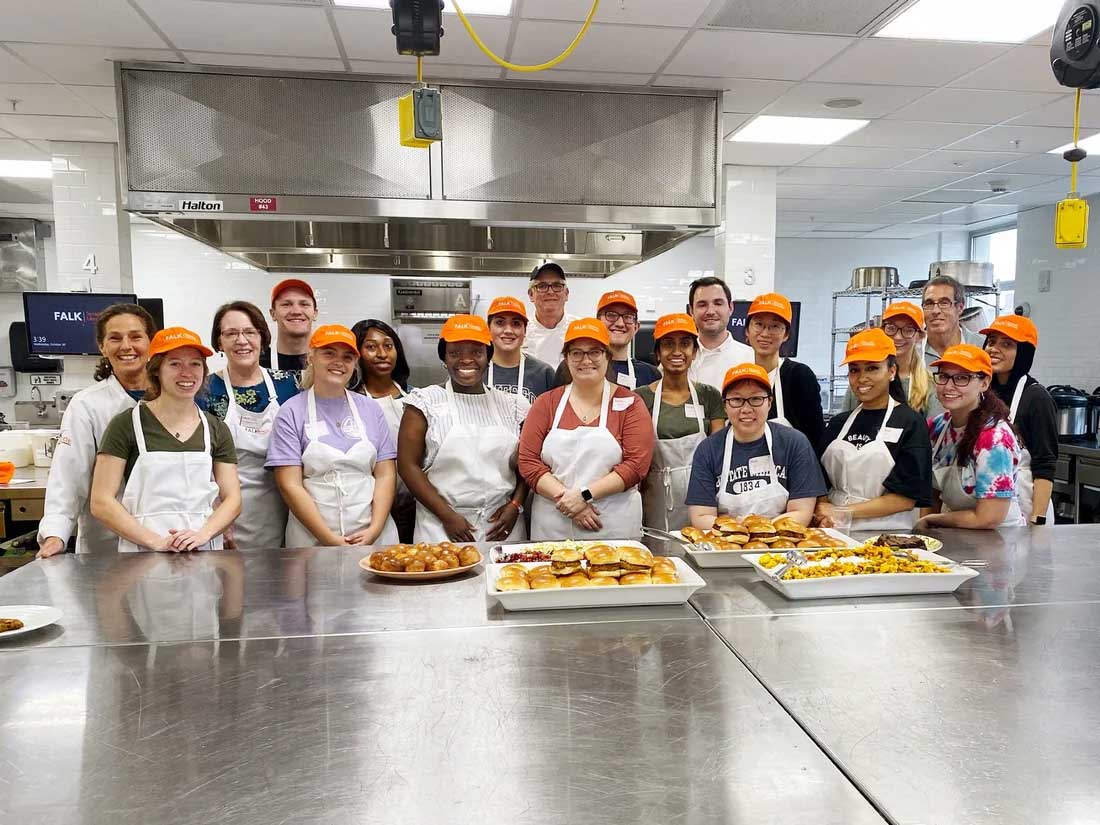
Raj, who directs Falk’s graduate programs in nutrition science as well as the new online Certificate of Advanced Study (CAS) in Integrative and Functional Nutrition, developed a module on functional nutrition for the course. “We teach medical students a systems biology approach to integrate diet, genetics and lifestyle to address underlying causes of chronic disease,” she says. Additional modules addressed obesity, diabetes, cardiovascular disease, pregnancy, pediatrics, oncology and cancer prevention, and vegetarian diets.
Building Bridges
Raj believes the course builds a bridge between medicine and nutrition that benefits the entire community. “The alliance between Falk and Upstate provides a seat at the table for the nutrition professional along with medical and allied health professionals,” she says. “We’re fostering a health care climate where nutrition is seen as part of the health care paradigm—not a separate entity—and emphasizes a partnership between patient, physician and the nutrition professional for sustained long-term health.”
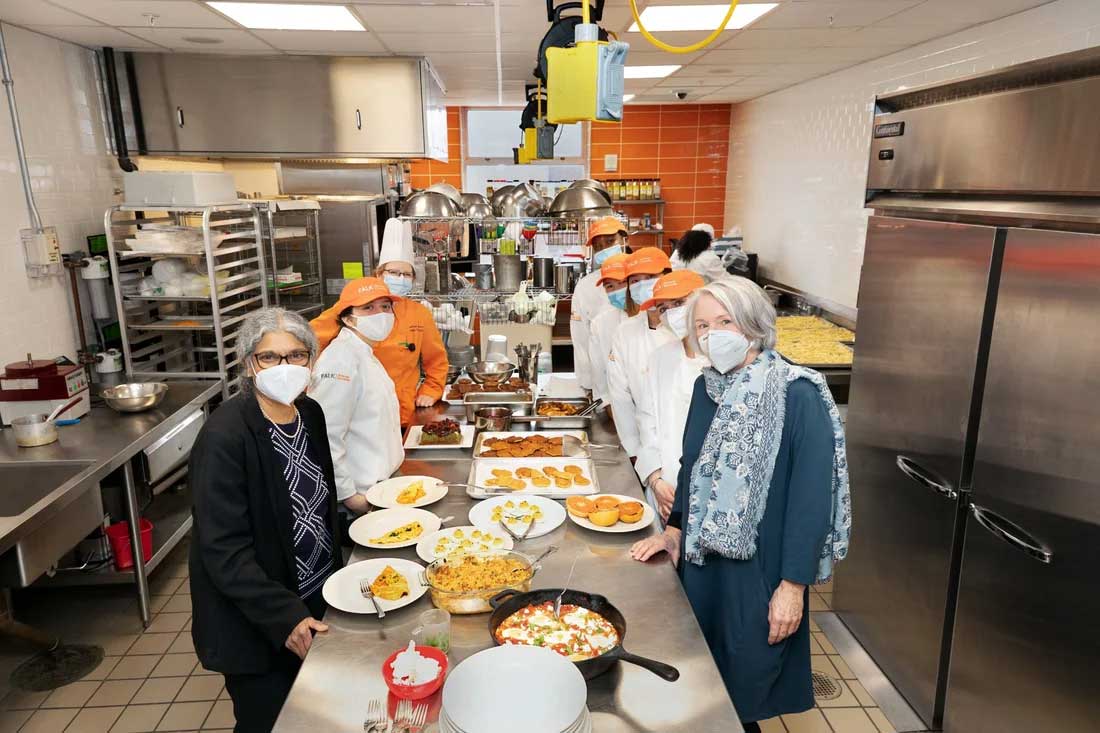
The collaboration also reinforces Syracuse University’s commitment to experiential learning and community service, and it has created valuable opportunities for students from both institutions. “For the past two years I’ve taken part in an interdisciplinary education initiative with a colleague who teaches in the Respiratory Therapy program at Upstate,” says Bruening. “This year, I led a lecture and workshop on nutrition and respiratory function for her respiratory therapy students. She, in turn, took small groups of Falk students from my Medical Nutrition Therapy class to her teaching lab at Upstate, where they learned about respiratory interventions and intubated a mannequin. The nutrition science students loved it, and the dietetics students learned firsthand how respiratory interventions that keep patients alive can affect their ability to obtain adequate nutrition.”
Community partners like Brady Farm and the University United Methodist Church food pantry provide guest speakers and field trip opportunities for students, and Food Bank of Central New York offers sessions with local nutritionists and registered dietitians. One was led by Falk nutrition alumnus Deb Mimaroglu ’14 and another by Heather Brubaker G’18, who focused on how trauma can affect interactions with participants in nutrition education and counseling sessions.
A popular feature of the course is Culinary Medicine Day, when students create and taste healthy, plant-forward dishes. It was originally held in the Falk teaching kitchens with the help of Falk culinary specialist Bill Collins, but in 2020 pandemic restrictions inspired Bruening to switch to a live virtual presentation from her home kitchen. It was so flexible and cost effective they decided to conduct the 2021 event virtually again, this time in Feuerstein’s home kitchen.
Enriching Falk Students
Raj says teaching has been her passion since high school. “I see teaching as a two-way street where I share my knowledge and at the same time I learn from my students, peers and colleagues,” she says. “They have nourished my personal and professional development through the years, and I think I am better for it.”
Bruening echoes that admiration for Falk College students. “Our students share a passion for the relationship between food and health,” she says. “Education standards are so much more rigorous than when I was a student, and Falk students rise to those challenges. I have tremendous respect for them.”
In August 2020, Bruening was named a clinical instructor in Upstate’s Department of Medicine. It is an honor that recognizes her voluntary role and gives her access to Upstate Medical University’s library resources. “I think the sharing of expertise and resources creates a two-way benefit,” Bruening says. “Physician graduates from Upstate gain specific understanding of the significance of nutrition in the causes and treatment of disease and the role of nutrition professionals in patient care. And I learn things from the medical students and faculty that I share with our nutrition students. Our hope is that the long-term effect will be better patient care and health outcomes.”
~ An SU Story by Mary Beth Horsington originally published on March 15, 2022.
Bringing Hope to Others
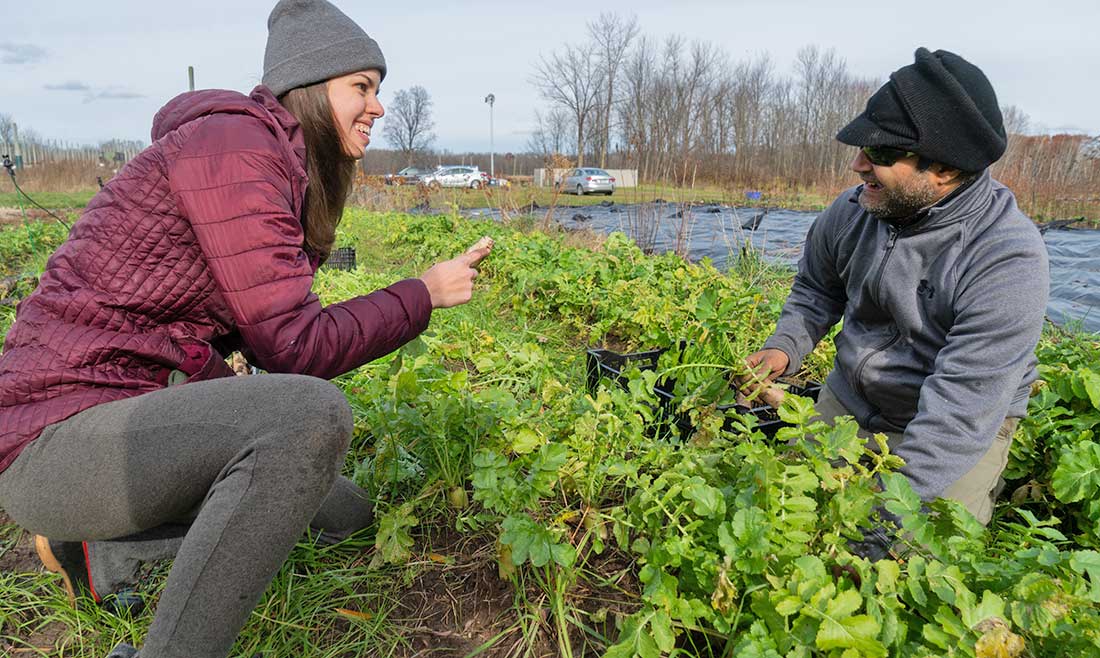
Growing up in Poughkeepsie in the Hudson River Valley region, Anna Zoodsma enjoyed foraging for berries with her father, cooking and baking, and “being creative with food.” When she started working on farms after graduating from high school, she was able to connect her love of the outdoors with her love of food.
“As I learned more about things such as agroecology, seed sovereignty and farm worker experiences, I began to see how our whole world is connected through food, Zoodsma says. “So many things I care about–the natural environment, the humans around me, justice–are deeply intertwined with food systems.”
Zoodsma, who received her undergraduate degrees in environmental science and geography from SUNY Oneonta, is working toward her master’s in Food Studies at Falk College with a Certificate of Advance Study in Civil Society Organizations from the Maxwell School of Citizenship and Public Affairs.
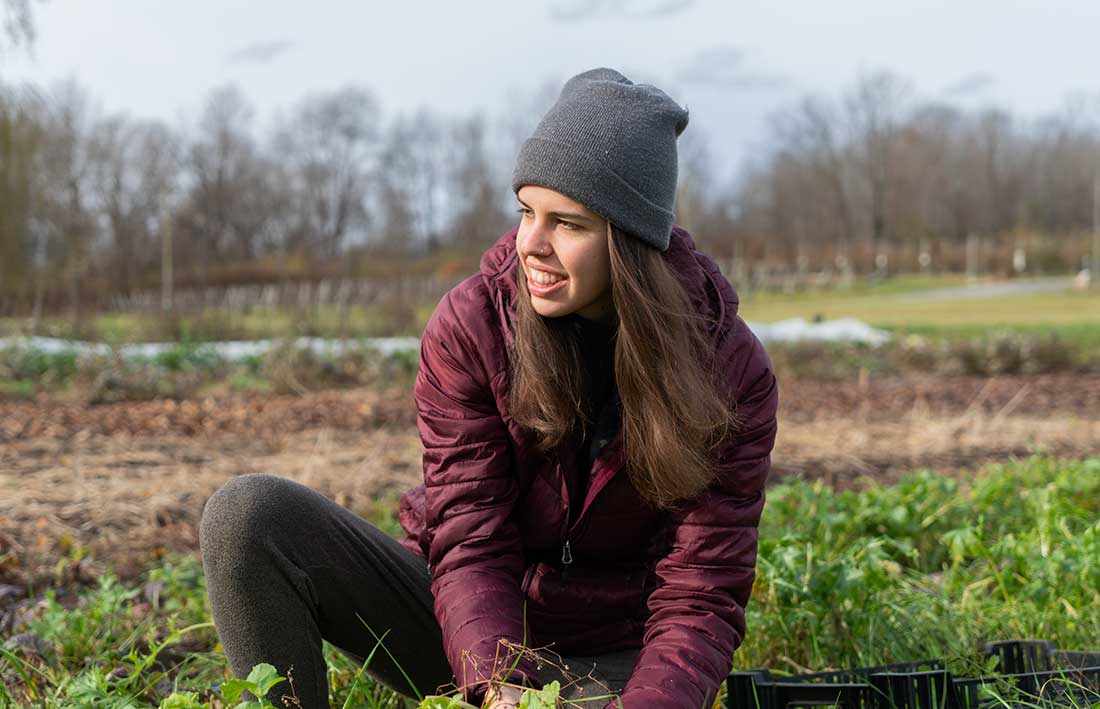
In her limited spare time as a graduate student, teaching assistant and research assistant, Zoodsma likes to cook, read and explore the outdoors, and she found a few minutes to chat with us about her experience at Falk, volunteering at Salt City Harvest Farm in Kirkville, and her future plans.
Why did you choose Syracuse University?
Though I am originally from New York, for a few years before this program I was farming in Colorado and then guiding wilderness canoe trips in Florida. When COVID arrived, I applied to a few places but thought being back in New York and closer to my family might make sense. I was impressed by the Food Studies program at Syracuse so after receiving a TA position and speaking with a few folks in the department, I decided it was a good next step for me.
What’s your favorite class?
Food and Public Policy. This class looks at the policy decisions that have created the food system that exists today. It has been helpful to look at why the food system operates as it does, and practically assess the tools available to move from point A to point B in the food system. This class grounds some of the more theoretical sides of food system work.
Tell me about something special from your Syracuse experience.
Since coming to Syracuse I have learned how to cross-country ski! Last winter was the perfect storm, with limited options for things to do during COVID, a search for a winter hobby to support my mental health and living in a snowy place all coming together for me in the form of cross-country skiing. My favorite place to cross-country ski is at Highland Forest (in Fabius), but I have also enjoyed working as a cross-country ski attendant at Drumlins (Country Club) though the Recreation Services department at SU.
What do you do at Salt City Harvest Farm?
I am completing my practicum for the Food Studies program at Salt City Harvest, a local organization that provides farmland to New Americans in Syracuse. There are a couple of different parts involved with my practicum. For one, I am conducting ethnographic research that looks at how farming practices are related to community mental health. This involves volunteering and experiencing day-to-day farm activities, interviewing farmers about their experiences, and interviewing professionals who work in fields such as human rights, farming and mental health about these topics. My research may end in an academic publication, but it is largely meant to provide Salt City Harvest with a deeper understanding of farmers’ desires for the future, and to leverage future funding for the farm through a clearer articulation of the value of farming for those involved at Salt City Harvest.
With the farming season completed for the year as the seasons change, I am now analyzing the data I have collected and working on organizational planning work, such as sorting through possible grants to apply for and working with an advisory committee to hopefully have some new programing at the farm in the future!
What’s something you’ve learned at Salt City Harvest that has stuck with you?
One thing that is special about Salt City Harvest is the sense of community that is present. Though farmers are from a vast number of countries and speak a variety of languages, there is a strong sense of community present at the farm. Community is not reliant on an ability to communicate in the same language. Farmers mostly have individual plots but help one another out, share produce and share meals.
It’s a space that allows many to feel safe, continue their own traditions, and share a common goal. I think that this space of community is a huge strength and a reason farmers come back and do the hard work of farming every week. From my experience, this dynamic is something I find incredibly valuable and supportive, and something I will continue to seek out and seek to create in workplaces or neighborhoods I am involved in in the future.
What’s one thing people should know about the food system?
I think everyone needs to know that their food is a product of a long and winding history. To me, that means that the food I am eating is influenced by a huge array of factors, such as centuries of seed-saving practices, the interests of multi-national corporations, and historic land ownership, among other things.
It also means that the food I eat influences a huge array of factors such as my personal health, the livelihoods and safety of workers involved in producing it, and the climate, among other things. Being aware and being an active player in the food system is a massive way that we each can cultivate valuable changes both in our own lives, and in the world. An individual’s food choices, and the food choices that are available to them, are deeply historic, political and impactful.
What’s next for you?
I’m not sure what’s next for me! I am most passionate about and have spent most of my time at SU working on issues related to farm workers and farmer rights and would love to keep doing that type of work. I still have lots to figure out at this point, though!
What’s the most important thing you want to accomplish in your food studies career?
I want to bring hope to others. In my experiences as a student in environmental science and food studies programs, the topics I study can often look pretty grim and take a toll on you. But I also know that the times in my life that I have felt most passionate and inspired have been times I have felt connected with my natural environment and to the food that I am growing or preparing.
I think hope and persistence are huge tools of growth and are a light that I want to shine for others in food system spaces. That doesn’t mean blindly moving through the world without addressing injustices or practical limits, but it does mean envisioning a world that is different than the one we are in now and living your life to bring that reality a bit more into focus.
—Matthew Michael and Valerie Pietra
Dean’s Winter Welcome
Dear Falk Students,
Welcome back to Syracuse University! We hope you enjoyed your winter break and had the opportunity to relax and spend time with friends and family. We’re excited for all that lies ahead for you in Spring 2022. With that in mind, here are some important reminders as we start the new semester:
Public Health and University Communications:
Public health remains a critical priority for life on campus and in our wider Syracuse community. We fully expect all Falk College students to follow University public health guidelines and local public health mandates. By doing our part, we can keep each other safe and healthy. Please visit the Stay Safe website, the official source of public health information for Syracuse University, for guidance and updates.
Remember to check your Syracuse University email daily, as it is the primary communication method at the University. Your professors and University offices will contact you with important information using your Syracuse University email address (ending in “@syr.edu”), not your personal email address.
Student Support Services:
Falk Student Services counselors are here to provide you with private academic advising and help you meet your requirements and goals. In addition, they are your resource for private consultation related to student social and emotional concerns. If you have any concerns throughout your academic career, please contact Student Services or visit Suite 330 Barclay Hall in the Falk Complex.
Falk Career Services advisors, also located in Suite 330 Barclay Hall, can help you prepare for life after college through career exploration, internship and job searching, professional networking, and more. You can also search for opportunities through Handshake, the University’s job search and professional events portal.
In addition, you can connect to spiritual life on campus at Hendricks Chapel, and health and counseling services in the Barnes Center at the Arch.
Student Lounges, Computer Labs, and Cafés:
The Student Lounge, located in Falk 216, is available to you any time the Falk Complex is open. The lounge has a microwave, refrigerator, and vending machines for student use. Just down the hall is Falk 229. This quiet student lounge has both Windows and Mac computers that are available to students any time the Falk Complex is open.
Falk 113, 400, and 407 are Windows computer labs that are also used as teaching classrooms. They are available to students any time class is not in session. You may check the schedule of availability using the Orange Events website. You may also use the quick-print stations in Falk 216 and 229 for printing and email. These stations log out automatically after 15 minutes of use.
The Falk Café on 2 is expected to open Feb. 2 on a limited basis. Check the Food Services website for other campus cafés and operating hours, which are subject to change.
Ways to Get Involved:
Get to know many of the hundreds of Syracuse University student organizations at the Winter Student Involvement Fair 11 a.m. to 3 p.m. Jan. 26, 2022, in Goldstein Auditorium, Schine Student Center.
You can also discover activities and events on campus by visiting the Syracuse University Calendar. Please note that events are subject to change according to public health guidelines. You can find the most up-to-date event information on the University Calendar. Once again, visit the Stay Safe website regularly for public health information and watch your University email for important announcements.
There are many other resources available to you at Syracuse University beyond these important highlights. Please visit the For Students page to review a more comprehensive listing of student resources to enhance your experience at Syracuse.
Thank you for being part of the wider Syracuse University community and our Falk College family. On behalf of the Falk faculty and staff, I wish you the best for Spring 2022.
Go Orange!
Diane Lyden Murphy, M.A., M.S.W., Ph.D.
Dean
Falk College
Growing Food and a Future
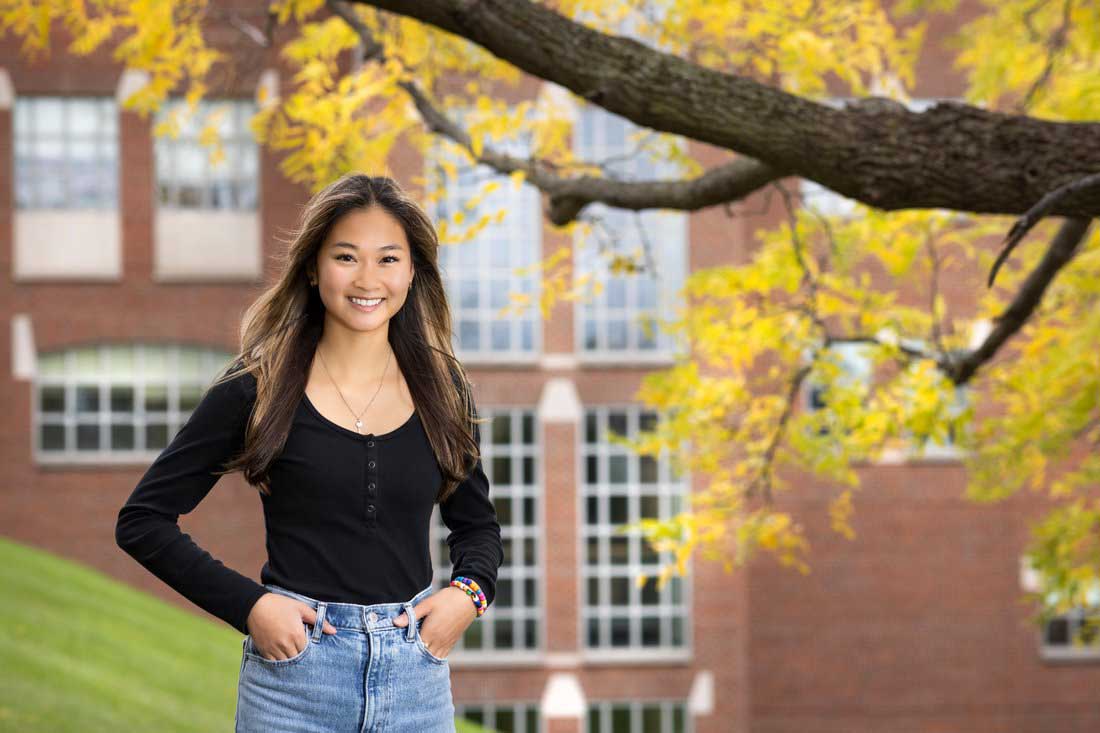
On an overcast day in early fall, the bright colors in Pete’s Giving Garden on Syracuse University’s South Campus draw the eye. Late summer flowers bloom along the fence and orange gourds dot the ground where squash vines spread. Phoebe Ambrose ’22 surveys the raised beds where peppers and hardy greens still thrive. There’s much to be done in a garden at the end of the growing season. Today she plans to weed, but she’s thinking ahead to winterizing chores and the fall planting that still needs to be done.
Ambrose—who majors in food studies in the Falk College and citizenship and civic engagement in the Maxwell School and the College of Arts and Sciences—has shaped her academic journey around her interest in community agriculture and food security. One of Ambrose’s goals this year is to develop strategies for increased and sustained student engagement with Pete’s Giving Garden, which supplies fresh produce to campus food pantries. “If we can get more people working regularly in the garden, we’d increase its output potential a great deal, which could have a big impact addressing food insecurity in our campus community,” she says.
Ambrose grew up on a working farm in nearby Jamesville, New York, where her family raised goats, alpaca and horses. Ambrose’s mother, Janet Ambrose ’82, G’91, taught textile design at the University and used cashmere and wool from their animals in her work. But when Ambrose first joined the food studies program, she envisioned studying the culinary field with an eye toward opening a restaurant. It was a class she took in her first semester, taught by the late Evan Weissman G’12, an associate professor in food studies and nutrition, that changed her focus. “We studied how food insecurity is related to distribution and access and how, although we produce enough food to feed everyone in the world, many communities lack infrastructure like grocery stores and viable transportation to make that food accessible,” she says. “The introduction to food studies really got me thinking about how community-based farming can address both hunger and social justice in our communities.”
Getting Involved
Ambrose was inspired by Weissman’s community work to advance food justice in Syracuse. She started volunteering at Brady Farm, a 6-acre produce farm on a lot in downtown Syracuse, where she learned how to grow vegetables and experienced first-hand the important role the farm plays in the community. “The farm provides so much more than food,” she says. “It’s a place to exchange recipes, heartache and ideas for grassroots change. It creates an environment of powerful growth and resilience and working there confirmed for me that I want to be part of creating spaces like that.”
Ambrose engaged in other initiatives at the intersection of food and community building as well. She started a gardening program for kids at a local summer camp, served meals to seniors at a community center, prepared pre-packaged lunches for a soup kitchen, and gave tours of local farms during the Onondaga On-Farm Fest.
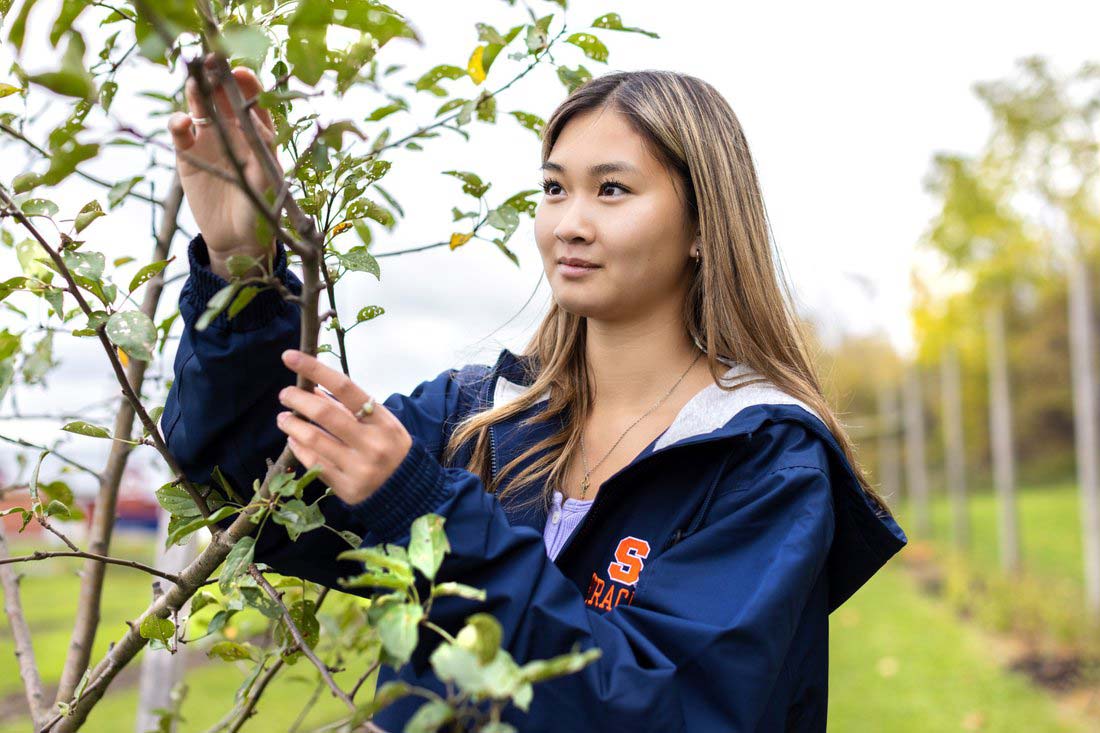
Through her service with a range of nonprofits, Ambrose came to appreciate the importance of collaboration between organizations that share similar goals. As one of six students selected for a Lender Center for Social Justice fellowship this academic year, she has an opportunity to help make such collaborations easier. Ambrose is working on a project that was designed by Weissman and is carried on in his honor by Jonnell Robinson, a Lender faculty fellow and associate professor of geography and the environment in the Maxwell School. The project seeks to understand the dynamics of local food systems and initiate programs to address the areas where community needs are not being met.
As a Lender fellow, Ambrose engages in active research, interviewing many players in local food-centered programs to gain deeper insight into community-driven food policies and practices as well as the strengths, weaknesses and structural inequalities of the local food system. “The research we are doing through the Lender Center fellowship helps organizations collaborate on new food security solutions,” she says. “I get to see all these different connections fit together to make solutions that are well-rounded and answer what the community is asking for.”
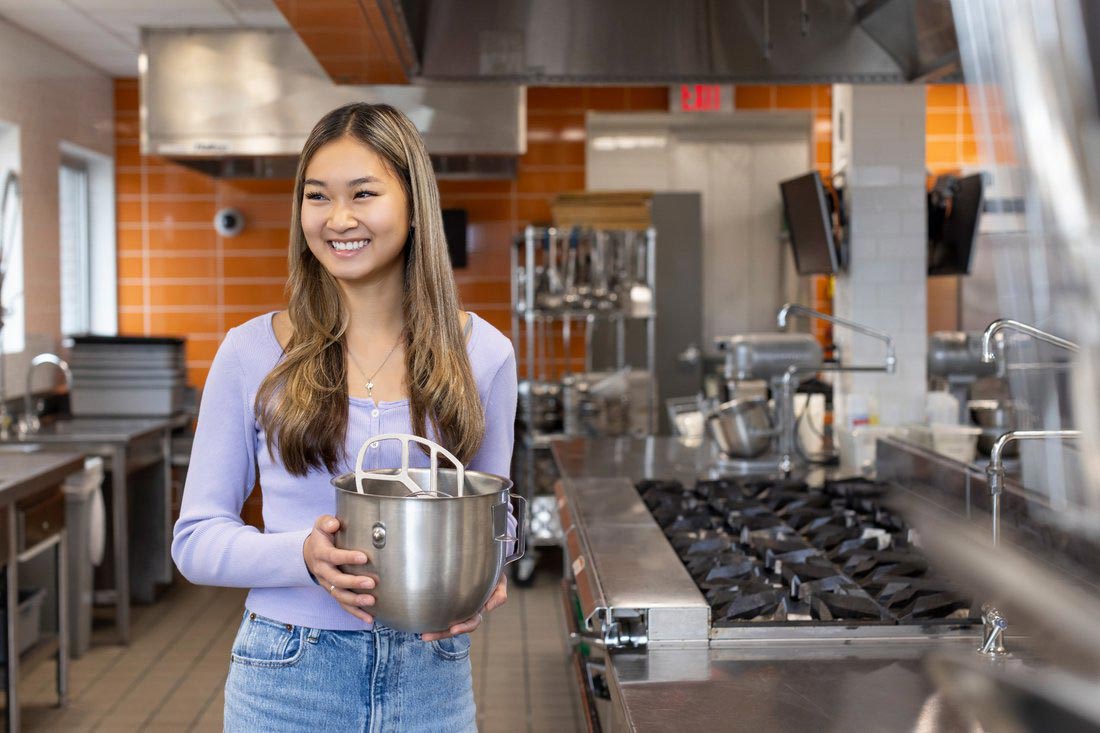
Nurturing Growth
“If I had to choose my favorite aspect about working in a garden, it would be observing a single seed transform into a powerful plant that produces food,” Ambrose says. This is an apt metaphor for the growth she’s experienced while at Syracuse. Ambrose credits faculty mentorship and support for helping her find opportunities to challenge herself—such as the distinctive Mount Vernon Fellowship she earned through the Center for Fellowship and Scholarship Advising—and discovering an academic approach that allows her to marry passion with purpose. “My dual major allows me to put the conceptual knowledge I learn in food studies to practical use,” she says. “Through the citizenship and civic engagement program I engage in the community by working on a problem that I’m passionate about.”
And while Ambrose’s focus so far has been on the Syracuse community, she plans to expand her studies in a master’s program in the United Kingdom, focusing on how to address issues of food scarcity and justice at a more global scale. This aspiration is tied to her family history. Both Phoebe and her sister, Ruth Ambrose ’22, who majors in French and francophone studies in the College of Arts and Sciences, were adopted from Vietnam when they were infants. Although Ambrose has no memories of Vietnam, her knowledge of her biological family is a deeply important part of her identity. “My experiences have prepared me to help bring the comfort of food security to children facing the sort of hunger my family in Vietnam did,” she says. “This is a driving force behind my passion and fight to one day live in a food-secure world.”
A Syracuse University Story by Sarah H. Griffin originally published on November 30, 2021.
October 28 event features alumni in disability advocacy
Falk College Career Services will host the “Falk College Alumni Speaker Series: Improving Access for People with Disabilities” on October 28, 2021, from 3:30 to 4:45 p.m. in Grant Auditorium, followed by a networking reception with refreshments from 5 to 6:30 p.m. The panel discussion will focus on current issues surrounding accessibility in a range of environments, and will be of particular interest to students seeking internships or careers in healthcare, mental health, education, policy and advocacy, and sport and recreation.
This is the fourth event in a series of Falk College alumni panels, which bring alumni back to campus to discuss current industry trends of interest to Falk students and share valuable career experiences and insights. Previous alumni panels have focused on topics such as community health and wellness; promoting exercise and nutrition as natural approaches to health, and; sport, health and social activism.
“For students, this is an exceptional opportunity to learn more about how they can be an advocate in whatever field they pursue,” says David Sly, director of Falk College Career Services. “In addition to learning about the specific careers of our panelists, students, faculty, and staff can leave this event with ideas for better serving people with a range of disabilities in any setting.”
The “Improving Access for People with Disabilities” panel will include four Falk College alumni:
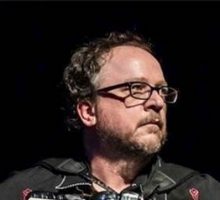
Scott Ebner, MSW ’97
Scott Ebner is the Executive Director at CIRCARE, a local agency that supports people with behavioral health disabilities, including family and employment support. He has also worked with Provisions Bakery in Armory Square, a work transition site for people with mental illness.
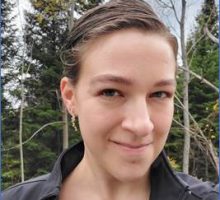 Jeremy French-Lawyer, BS Public Health ’14
Jeremy French-Lawyer, BS Public Health ’14Jeremy French-Lawyer is the Assistant Director of Evaluation, Assessment and Research at SUNY Upstate Medical University. Jeremy also has previous experience as a Disability Integration Fellow with SUNY Upstate, integrating disability-relevant information into medical school and continuing medical education curriculum. Other previous roles include working with children and at-risk parents in education and healthcare settings. Jeremy holds a master of public health (MPH) degree jointly awarded from Syracuse University and SUNY Upstate Medical University.
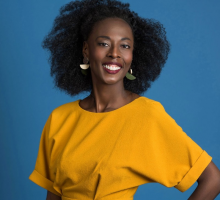 Ocesa Keaton, MSW ’15
Ocesa Keaton, MSW ’15Ocesa Keaton is the Central New York Regional Director for New York Civil Liberties Union and has previously served as the ADA Coordinator for the City of Syracuse. Ocesa has extensive experience in youth and advocacy programs, with a focus on at-risk pregnant and parenting teens, youth violence prevention, and poverty.
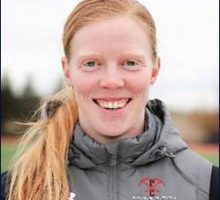 Eileen May-West, BS Sport Management ’10
Eileen May-West, BS Sport Management ’10Eileen May-West is the Program Director at Wasatch Adaptive Sports and leads outdoor adaptive recreation operations for over 500 individuals with disabilities each year. Eileen holds a master’s degree in therapeutic recreation from the University of New Hampshire.
For Syracuse University students, registration is appreciated, though not required, through Handshake. For faculty, staff and community attendees, please RSVP to falkcareers@syr.edu. CART and ASL services will be provided. To request other accommodations, please contact Falk Career Services at falkcareers@syr.edu or 315.443.3144. For event information, visit the event page.
Food and social justice advocate Avalon Gupta VerWiebe named first recipient of the Evan Weissman Scholarship
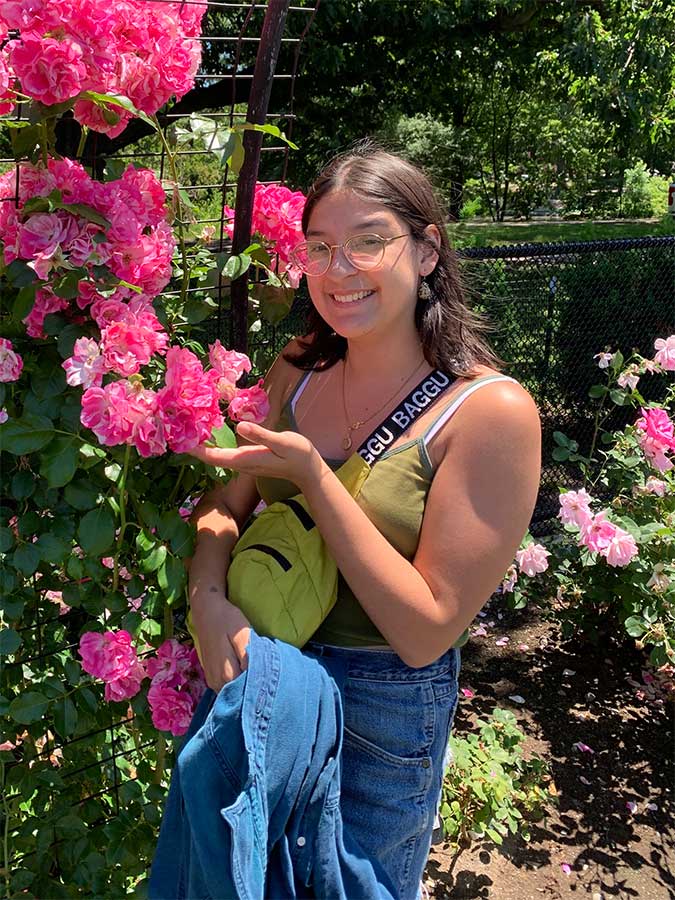 Avalon Gupta VerWiebe, a food studies graduate student in Syracuse University’s Falk College, is the first to receive the Evan Weissman Scholarship, a newly created scholarship fund honoring the late Professor Weissman that supports food studies graduate students. Gupta VerWiebe’s personal dedication and ongoing work in the fields of food and social justice and community food projects follow the legacy of Professor Weissman’s life-long commitment to food justice and using food as a tool for social change.
Avalon Gupta VerWiebe, a food studies graduate student in Syracuse University’s Falk College, is the first to receive the Evan Weissman Scholarship, a newly created scholarship fund honoring the late Professor Weissman that supports food studies graduate students. Gupta VerWiebe’s personal dedication and ongoing work in the fields of food and social justice and community food projects follow the legacy of Professor Weissman’s life-long commitment to food justice and using food as a tool for social change.
Gupta VerWiebe is from Syracuse, New York, but moved to Louisville, Kentucky where she attended high school and completed her undergraduate degree in public health. “From the systemic inequalities I witnessed, I developed a passion for environmental justice and later food justice,” says Gupta VerWiebe. Before starting graduate school, she was involved with many organizations working in food justice, such as Louisville Community Grocery, Field Day Family Farm, Garden Commons Community Garden, New Roots Fresh Stop Markets, and the Cardinal Cupboard Food Pantry, all in Louisville.
“I applied to Syracuse University’s food studies program because it offers courses that examine the social, political and cultural elements of the food system,” she says. “These courses are giving me the tools to advocate for transformational change.” The Falk College food studies program focuses on the social, political, economic, and environmental contexts of food production, manufacturing, distribution, and consumption—locally, nationally, and globally. Students of the program gain a deep understanding of food policy and governance, gastronomy, health outcomes of food systems, human nutrition, and food access.
“I hope to one day be able to work towards a more just food system that allows everyone the access to culturally appropriate, delicious, safe and healthy food grown and distributed by just means,” adds Gupta VerWiebe.
At Syracuse University, Gupta VerWiebe is completing a practicum with the university’s Lender Center for Social Justice. As a Lender Center Fellow, she works with the Syracuse Onondaga Food Systems Alliance (SOFSA) and is engaged in efforts to create an equity statement for SOFSA. In addition, she is working with the Onondaga Nation and with youth to document food stories of elders.
“Avalon stands out in her deep commitment to social and racial justice in the food system,” says Professor Laura-Anne Minkoff-Zern, Gupta VerWiebe’s advisor and the director of the graduate food studies program. “Since returning to Syracuse last year, she has taken every opportunity to get involved in community-based food system projects here in the city. She embodies Professor Weissman’s personal and professional commitments to community-engaged research and creating lasting ties that improve food access and sustainability for all.”
Professor Evan Weissman was a tireless advocate for equity in the food system. A highly approachable, committed teacher who engaged students in community-based work to advance social change, his efforts provided the foundation for many communities regionally, nationally, and beyond for grassroots food justice initiatives. He passed away unexpectedly in April 2020. To honor his legacy and to continue the work he believed in so deeply, his family created the Evan Weissman Scholarship Fund to defray tuition costs for food studies graduate students.
“This scholarship is an invaluable gift that will allow me to continue these studies,” says Gupta VerWiebe. “I am beyond honored to receive this scholarship in Evan Weissman’s name. Although I did not get a chance to meet Dr. Weissman, stories of how he advocated for social justice in the local food system and within the University inspire me to do the same.”
Learn more about the food studies program.
Coming Back Together 2021
Starting in 1983, Coming Back Together (CBT) was the first reunion of its kind. Every three years, Black and Latino/a alumni come back to campus to celebrate their accomplishments, meet current students, and remain connected with the University.
The theme of this year’s reunion is “Celebrating 151 Years of Black and Latino/a Excellence at SU.” Over the four-day weekend, workshops, receptions, social events and cultural activities will be offered to attendees. Highlights include the CBT Celebrity Classic basketball game, a special concert featuring 90s R&B trio SWV, tailgate on the Quad and football game vs. Rutgers University, fundraising gala and awards ceremony, and a Sunday worship service featuring Grammy-winning gospel artist BeBe Winans.
Coming Back Together Awards

Syracuse University’s Office of Multicultural Advancement will be recognizing accomplished alumni during Coming Back Together (CBT) this September. One of them is Falk College Sport Management major Jasmine Jordan-Christmas ’14. She will be receiving a Young Alumni Award for Excellence in Fashion.
She will be honored for her extraordinary professional achievements by Chancellor Kent Syverud at an awards ceremony on Saturday, Sept. 11, from 7 to 9 p.m. at Goldstein Auditorium in the Schine Student Center.
Presented to African American and Latino/a alumni during CBT, the awards serve to recognize the significant civic or career achievements by the selected winners. Since 1983, the ceremony has been a signature event presented at the CBT reunion.
“The 2021 awardees represent some of the University’s best, brightest and most engaged alumni,” says Rachel Vassel, associate vice president in the Office of Multicultural Advancement. “While achieving tremendous professional success across diverse fields, these individuals are dedicated to Syracuse University and we are forever grateful to them for the many ways they support our work.”
Jordan-Christmas is a sports marketing professional for Nike’s Jordan brand, a fashion influencer and 2014 graduate of the Falk College sport management program. The daughter of basketball legend Michael Jordan, Jordan-Christmas is forging her own legacy in the sports industry and has worked closely with some of the most notable brands in sports over her 10-year career.
In her current role as field representative for sports marketing, basketball and women’s, with Nike, Jordan-Christmas manages athletes who represent the Jordan brand. She recently led an initiative to shape the future of basketball culture for women and young girls by expanding the brand’s WNBA roster to eleven active players, the largest in the brand’s history. Previously, she worked as operations coordinator for the Charlotte Hornets.
Jordan-Christmas is married to former Syracuse basketball player Rakeem Christmas and the mother of a toddler son, Rakeem “Keem” Jr. She is an Our Time Has Come scholarship donor and supports her family’s philanthropic efforts through the Rakeem Christmas Foundation and the Novant Health Michael Jordan Family Medical Clinic in Charlotte, North Carolina. She recently provided a special video message of encouragement for the Class of 2020’s virtual commencement.
Orange Circle Awards
Alumni and student groups will also be honored through the Orange Circle Awards as part of Coming Back Together 2021 celebration. Recipients are altruistic members of the SU community who have done extraordinary things in the service of others. From generous financial support to selfless volunteerism, the Orange Circle Awards recognize students, faculty, staff and alumni who possess a deep responsibility for acts that better society.
This year the Food Busters student group will be honored for their work in the Syracuse community. Food Busters was started by students within the nutrition program at Falk College.
Honors will be given during the Orange Circle Awards ceremony and reception, held from 2-4 p.m. on Sept. 9 as part of Syracuse University’s Coming Back Together celebration. The awards ceremony will occur in the Grand Hall of the Daniel & Gayle D’Aniello Building, home to the National Veterans Resource Center.
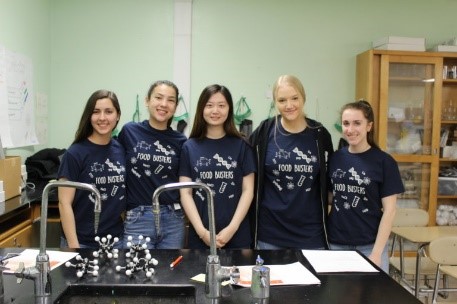 Food Busters strives to improve literacy skills and public health awareness of fellow students in the Syracuse community. The organization was created in 2014 by ShawFood Busters group photo Center nutrition volunteer coordinators Jennifer La ’14 and Katelyn Castro ’15 and Engagement Fellow Victoria Seager G’15. It sends Syracuse University volunteers from the Shaw Center into local schools to teach students to implement lesson plans designed around content they are learning in their school or college.
Food Busters strives to improve literacy skills and public health awareness of fellow students in the Syracuse community. The organization was created in 2014 by ShawFood Busters group photo Center nutrition volunteer coordinators Jennifer La ’14 and Katelyn Castro ’15 and Engagement Fellow Victoria Seager G’15. It sends Syracuse University volunteers from the Shaw Center into local schools to teach students to implement lesson plans designed around content they are learning in their school or college.
This year, Food Busters worked with Henninger High School students in hands-on, STEM-focused lessons designed to explore the relationship between food, nutrition, health and media, while also increasing these students’ comprehension in the fields of literacy, mathematics and science. Along with nutrition students from Falk College, the Henninger High School students learned to perform their own food science experiments based on the lesson plans.
Falk College CBT Event
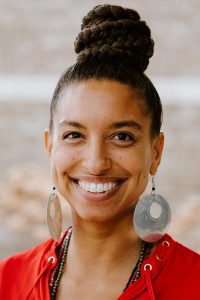
The food studies program is also hosting Leah Penniman during this year’s Coming Back Together celebration. The event, “Soup JOUMOU and a lecture TOO!,” will feature a luncheon with Soup Joumou – the Haitian liberation meal as well as a lecture by Leah.
Leah is a Black Kreyol farmer, author, mother, and food justice activist who has been tending the soil and organizing for an anti-racist food system for 25 years. She currently serves as founding co-executive director of Soul Fire Farm in Grafton, New York, a Black & Brown led project that works toward food and land justice. Her book is Farming While Black: Soul Fire Farm’s Practical Guide to Liberation on the Land.
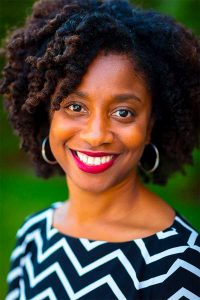
The event will be moderated by Rick Welsh, Chair of the department of Nutrition and Food Studies with panelists Marcelle Haddix, courtesy appointed professor of Food Studies, and Estelí Jiménez-Soto, assistant professor of Food Studies.
Marcelle Haddix will also be receiving an Orange Circle Award this year for her work in the Syracuse community. Haddix chairs the School of Education’s Reading and Language Arts department, and is the inaugural co-director of the Lender Center for Social Justice. Her scholarly pursuits focus on the experiences of students of color in literacy and English teaching and teacher education, as well as the importance of centering Blackness in educational practices and spaces.
For a full list of CBT events and registration information, visit the Coming Back Together 2021 website.
Falk College welcomes new faculty and staff
Syracuse University’s Falk College is pleased to welcome four new staff members who have joined Falk College in the past academic year: Stephen Bonomo, Director of Information Technology; Deborah Golia, Director of Admissions; Kailyn Jennings, Sport Management Internship Placement Coordinator; Danielle Jones, Social Work Internship Placement Coordinator; Donna Sparkes, Budget Associate, and; Emily Williams, Human Development and Family Science Internship Placement Coordinator.
In addition, Falk College is pleased to announce the appointment of six new faculty members, Lastenia-Francis, Catherine García, Esteli Jimenez, Kevin McNeill, Joey Merrin, and Fei Pei.
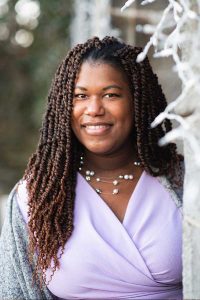
Lastenia Francis
Assistant Teaching Professor (Online), Department of Marriage and Family Therapy
Lastenia Francis (she/her/hers) joins the Department of Marriage and Family Therapy in the Falk College of Sport and Human Dynamics as an Assistant Teaching Professor (Online) in fall 2021. She will teach courses on family systems theories and practice.
Francis is a Licensed Marriage and Family Therapist and a certified trauma therapist. She has been practicing since 2014 with an attention to helping minority populations. Francis has provided clinical services in an outpatient clinic in the South Bronx working with low-income communities and communities of color, an intensive preventative program, at the Veterans Affairs as a Readjustment Counselor, and built a private practice that focuses on building strong families in communities of color. Francis previously taught at Mercy College in the Marriage and Family Therapy Program and continues to act as a mentor to developing Marriage and Family Therapists as an American Association for Marriage and Family Therapy (AAMFT) Approved Supervisor.
Francis continues to have an insatiable appetite for helping people of color maximize their potential in how they relate to themselves, their spouse, and their family and demonstrates that in her research interest. Dr. Francis was drawn to academia through her passion for training more social justice clinicians to help strengthen families especially those in minority and underserved communities. Her dissertation research focused on the reintegration experiences of Black veterans and their families.
Francis is the Founder of Meaningful E-Motion Private Practice, Assistant Editor of the American Family Therapy Academy (AFTA) blog, and a member of the AAMFT and the AFTA.
Francis Earned a Ph.D. in Marriage and Family Therapy from Northcentral University in 2021, a M.S. in Marriage and Family Therapy from Mercy College in 2015, and a B.A. in Psychology and Sociology from Stonybrook University in 2013.

Catherine García
Assistant Teaching Professor, Department of Human Development and Family Science/Aging Studies Institute
Catherine García (she/her/hers) joins the Department of Human Development and Family Science in the Falk College of Sport and Human Dynamics as an Assistant Professor in fall 2021. At Syracuse University she will teach classes in Midlife Development and Gerontology.
Prior to joining Syracuse University, García was an Assistant Professor of Sociology and core faculty member of the Minority Health Disparities Initiative (MHDI) at the University of Nebraska – Lincoln where she taught quantitative methods and served as a faculty mentor for the MHDI Summer Research Program.
García’s research focuses on Latina/o/x aging and health in the United States and Puerto Rico, applying multidisciplinary approaches to understand how the interaction of biological, environmental, and social factors influence the disease process among older Latina/o/x adults. Her research work has led to 15 peer-reviewed publications and two book chapters, including multiple manuscripts in The Gerontologist and The Journals of Gerontology, Series B: Psychological Sciences and Social Sciences.
Her research has been supported by the National Institute on Aging (NIA) of the National Institutes of Health (NIH), including an R36 Aging Research Dissertation Award to Increase Diversity from 2018-2020 and an R01 Research Supplement to Promote Diversity in Health-Related Research from 2021-2023. Her research has led to several awards, including the Emerging Scholars and Professional Organization (ESPO) Interdisciplinary Paper Award, the ESPO Poster Award, and the Minority Issues in Gerontology Poster Award from the Gerontological Society of America.
Currently, she serves as a steering committee member for the Network for Data-Intensive Research on Aging (NDIRA) at the University of Minnesota and is a committee member of the Minority Issues in Gerontology Advisory Panel (MIGAP) of the Gerontological Society of America. In addition, she will serve on the editorial board for the Journal of Health and Social Behavior beginning in January 2022.
She earned a Ph.D. in Gerontology in 2020 from the University of Southern California, an M.S. in Sociology from Florida State University in 2014, and a B.A. in Sociology with a minor in Human Complex Systems from the University of California – Los Angeles (with college and departmental honors) in 2010.
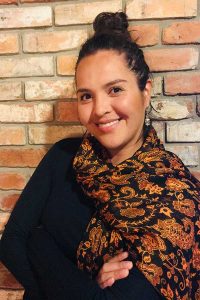
Estelí Jimenez-Soto
Assistant Professor, Department of Nutrition and Food Studies
Estelí Jimenez-Soto (she/hers) joins the Department of Nutrition and Food Studies in the David B. Falk College of Sport and Human Dynamics as a tenure-track assistant professor of food studies in fall 2021. At Syracuse University, she will teach classes in Agriculture and the Environment, including Agroecology, and Climate Change and the Food System. She joins the Syracuse Cluster Initiative in Energy and Environment.
Prior to joining Syracuse University, Jimenez-Soto was a postdoctoral scholar at the University of California Santa Cruz in the Department of Community Studies from 2020-2021, and in the Department of Environmental Studies from 2019-2020, where she taught principles of sustainable agriculture and worked on socioeconomic barriers and opportunities to adopt sustainable practices in strawberry production.
Her research uses interdisciplinary engagements, bridging the fields of agroecology and political ecology to examine environmental problems at the nexus of food, agriculture and the environment in both the U.S. and Latin American contexts. She has published in journals including Ecology and Evolution, Bioscience, and Journal of Peasant Studies and her work has been highlighted in publications such as The Economist.
Her research has been supported by UC-MEXUS, El Consejo Nacional de Ciencia y Tecnologia (CONACyT), the Organization for Tropical Studies (OTS) and P.E.O International. In 2020 she was a recipient of a Peter Ashton Award by Biotropica, a Gentry Student Award by the Association of Tropical Biology and Conservation in 2017, and a Mildred Mathias Award for best dissertation proposal by the UC-MEXUS in 2015.
She is an active member of the Ecological Society of America (ESA), the American Association of Geographers (AAG), the Latin American Studies Association (LASA), New World Agriculture and Ecology Group (NWAEG) and The Alliance for Women in Agroecology (AMA-AWA).
Jimenez-Soto earned her Ph.D. in Environmental Studies with an emphasis in Ecology and Evolutionary Biology, and a M.A. in Environmental Studies from the University of California Santa Cruz in 2018 and 2014 respectively; and an B.S. with honors in Agroecology in 2012 from Universidad Autonoma Chapingo in Mexico. She is originally from San Cristobal de las Casas, Chiapas, México.
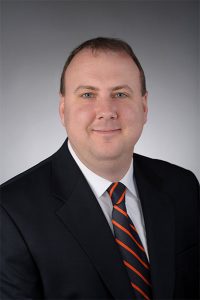
Kevin McNeill
Assistant Teaching Professor, Department of Sport Management
Kevin McNeill has been a member of the Department of Sport Management since 2019 in the David B. Falk College of Sport and Human Dynamics and will serve as assistant teaching professor beginning in the fall 2021. At Syracuse University, McNeill will teach classes in Sport Technology and Technologies in Game Day Operations.
McNeill previously served as an Internship Placement Coordinator in Sport Management and provided advising for undergraduate students in academics and career exploration. He assisted students through the senior Capstone process and taught classes in Professional Development in Sport Management.
Previously, McNeill worked at Le Moyne College as Associate Athletic Director in the Department of Athletics for 12 years as well as served Syracuse University Athletics as the Marketing Coordinator from 2004 to 2007.
While at Le Moyne, McNeill oversaw the marketing and communications for the Division II athletic program. In that role, he led programming in brand development, revenue generation, digital media, video production, corporate sponsorship, and game day management. In addition to serving on the athletic department leadership team, he co-chaired the College’s strategic plan marketing committee, participated in the College’s integrated marketing committee, and instructed in the Madden School of Business.
Serving as the Marketing Coordinator at Syracuse University Athletics, McNeill supported the department’s broad-based marketing initiatives with a focus on game day promotions, marketing campaigns, ticket sales, advertising, and graphic design.
McNeill earned a Master of Science, Sports Administration and Master of Business Administration from Ohio University in 2004 and a Bachelor of Science, Business Administration from Le Moyne College in 2002.
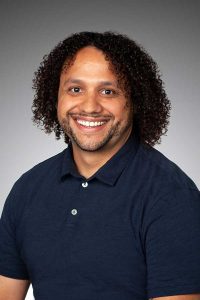
Joey Merrin
Assistant Professor, Department of Human Development and Family Science
Gabriel “Joey” Merrin (he/him/his) joins the Department of Human Development and Family Science in the Falk College of Sport and Human Dynamics in fall 2021. At Syracuse University, Merrin will teach courses in Child and Adolescent Development and Advanced Statistical Methods.
Merrin was most recently an assistant professor in Human Development and Family Sciences at Texas Tech University from 2019-2021 and taught graduate-level statistic courses where he focused on reproducible research, programmatic programming, and transparent designs using open science frameworks and guidelines. Before Texas Tech University, he held two post-doctoral fellowships, one in the Department of Psychology at the University of Victoria in British Columbia and the other in the Department of Health Management and Informatics at the University of Central Florida.
Trained as a developmental psychologist and applied methodologist, Merrin’s research seeks to clarify developmental processes through which adolescents’ experiences with their families, peers, teachers, and communities influence development of problem behaviors and experiences with identity-based harassment and victimization throughout adolescence and in the transition to young adulthood. He is particularly interested in the development of these behaviors among various minoritized and oppressed groups. His work focuses on translating and mobilizing knowledge to inform intervention and prevention efforts to improve the school experience for young people by using applied research designs, leveraging practical implications, and intentional school and community engagement.
His research has been supported by the Canadian Institutes of Health Research, National Institute of Health, and most recently, Merrin and his colleagues at Boston University launched a three-year National Institute of Justice funded study to examine bias-based harassment among adolescents to identify risk and protective factors across multiple levels of the social ecology.
Merrin was recently awarded the 2020-2021 New Faculty Award at Texas Tech University and selected into the Society of Prevention Research Early Career Prevention Scientists Training Program. Merrin currently serves on the editorial board for Prevention Science and Psychology of Violence.
Merrin earned a Ph.D. in Educational Psychology in 2017, an Ed.M. in Human Resource Development in 2011, and a B.A. in Sociology in 2009, all from the University of Illinois Urbana-Champaign.
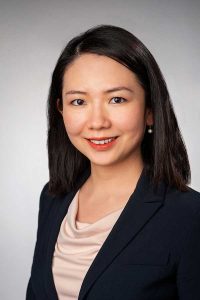
Fei Pei
Assistant Professor, School of Social Work
Fei Pei (she/her/hers) joins the School of Social Work in the David B. Falk College of Sport and Human Dynamics as a tenure-track assistant professor of social work in fall 2021. At Syracuse University, Fei will teach Social Welfare Policy and Services.
Prior to joining Syracuse University, Fei was a Ph.D. candidate at the Ohio State University College of Social Work where she also served as a graduate instructor and research assistant, teaching research methods, lifespan development, and social welfare.
The overarching goal of Fei’s research is to promote healthy development among vulnerable children, including maltreated and immigrant youths by identifying neighborhood disparities. In particular, her research focuses on community health and child development. She published over 20 peer-reviewed papers in rigorous academic journals including Child Abuse & Neglect, Children and Youth Services Review, Family & Community Health, Journal of Community Psychology, Journal of Interpersonal Violence, and Trauma, Violence & Abuse.
Fei was trained in all aspects of grant-funded and investigator-initiated research projects, ranging from university-funded projects to federal-funded studies (e.g., NIH funded and UNICEF funded projects). Her research has been acknowledged and funded by various institutions and scholarships such as the 2021 Merriss Cornell Distinguished Researcher Award, 2019 Kempe Interdisciplinary Summer Research Institute, 2018 International Peace Scholarship, Seed Funding for 2016 Clinton Global Initiative University, and 2015 New Brunswick Chancellor’s Scholarship.
Fei actively participated in professional and community services. She was a volunteered social worker for the local agency, Asian American Community Services in Columbus, OH and the president of the College of Social Work’s Doctoral Student Organization. She also serves as an ad hoc peer reviewer for multiple academic journals.
Fei earned a Ph.D. in 2021 from The Ohio State University, College of Social Work, a MSW in 2016 from Rutgers University – New Brunswick, and a LL.B. and a B.S. (double degree) in 2014 from Shanghai University and East China Normal University.
Page 8 of 21
